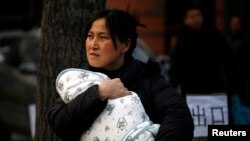As science has made significant fertility advances, empowering couples who were once unable to produce children, many countries have passed laws limiting access to the technology.
A fertility research group with ties to the World Health Organization reported that in 2013, most countries in Southeast Asia, as well as many Islamic nations, bar unmarried women from using the new technology to bear children.
China is among those governments that have taken a hard line - banning single women from freezing their eggs for future use - but the action has led to public uproar, particularly among women who want a final say on their own reproductive rights.
No Longer a 'Hush-Hush' Topic
The debate began last month when 41-year-old Chinese actress Xu Jinglei disclosed that she had gone to the U.S. two years ago to have nine of her eggs frozen, so as to save herself “an option.”
Following her revelation, state media, including CCTV and Xinhua News, cited Chinese health and family planning officials as saying the egg-freezing procedure is considered an assisted reproductive treatments and thus illegal for single women.
The health commission’s regulation, released in 2003, explicitly denied the treatment to “couples and single women, who are not in line with the nation’s population and family planning regulation.”
The ban immediately triggered public outcry.
China’s famous writer and race car driver Han Han first weighed in with a protest on his Weibo page - asking why a woman can’t have a baby without being married, “Can’t she use her own eggs?” he asked.
Han’s reaction was widely echoed by netizens. Some say the ban reflects “gender inequality since men in China are allowed to donate sperm” while others mocked that “the government’s ban will soon kick-start the most effective emigration campaign.”
National Debate Over Egg-Freezing
Many Chinese women, single or not, argue they are deprived of not only an option, but also the autonomy in their reproductive rights.
At a young age of 26, C. C. Chen from Shaanxi province said she would follow suit if she can afford the egg-freezing procedure, which she finds practical.
“In particular, women nowadays are in face of increased pressures from the society and work and may suffer a greater chance of infertility [when they get old]. So, if we can freeze our eggs at a younger age, it’ll be a pretty practical precautionary measure to me,” said Chen.
Sociologist Yaya Chen from the Shanghai Academy of Social Sciences argues that the Chinese women, single or not, shouldn’t be banned from the egg-freezing procedure since it is just the first step of the assisted reproductive treatment.
Basic Reproductive Rights
Chen further upholds the egg-freezing procedure as a reproductive insurance, for both single and married women, that China should take one step further to ease so as to tackle its problems of falling birth rate and aging population.
“I think restrictions should be fully relaxed to bestow single women rights of giving birth either via assisted reproduction or by natural birth,” she said, adding “because each woman should have her absolute reproductive rights while the government can provide some guidance.”
The sociologist believes the ban is an administrative overreach as the health commission’s interpretations of the family planning laws remains questionable.
In a written response to VOA, the commission reiterated that “the egg-freezing procedure falls in the category of the assisted reproductive treatment and is currently under a clinical study phase, whose development the commission will closely follow to ensure its safety and effectiveness.”
The commission further advises women in China to give birth at the appropriate age of 24 to 29 while warning them of the risk of childbearing after the age of 35.
In late 2013, China imposed an initial relaxation in its one child policy, allowing couples where at least one parent was an only child to have two children.
But that has so far failed to boost the birth rate in China. At the same time, other couples, or single women wishing to have babies, will be given penalties and their children will be deprived of citizenship.
Overhaul Needed
Critics thus believe more changes will be inevitable for China's family planning policies.
Another reason China discourages the egg-freezing procedure has to do with its claim of the procedure’s less than 50 percent survival rate, apart from its cost.
In other advanced parts of the world, doctors are more confident about the survival rate of frozen eggs. They note that the preservation duration may depend on the quality of each individual egg and that the success rate of an egg used in vitro fertilization may drop to 15 percent for pregnancy after the age of 40.
“The [egg-freezing] technique is very mature, so, the survival rate after thawing could be as high as 90 to 95 percent,” said Hsin-fu Chen, a gynecologist from National Taiwan University Hospital in Taipei.
Already, the ban has posed a barrier to a Los Angeles reproductive clinic’s plan to promote its egg-freezing treatment on Alibaba’s group-buying website Juhuasuan.
The Chinese website, last month, successfully connected more than 22,000 sperm donors with seven sperm banks in China through online booking during a three-day program.
But it is taking a cautious approach toward women’s egg-freezing programs.
“An [L.A.] clinic approached us, and, yeah, we had initial discussions, but nothing came out of those discussions," said Melanie Lee of Alibaba Group. "I think we have to look at the regulations that are currently in place to see what the regulations will allow.”




